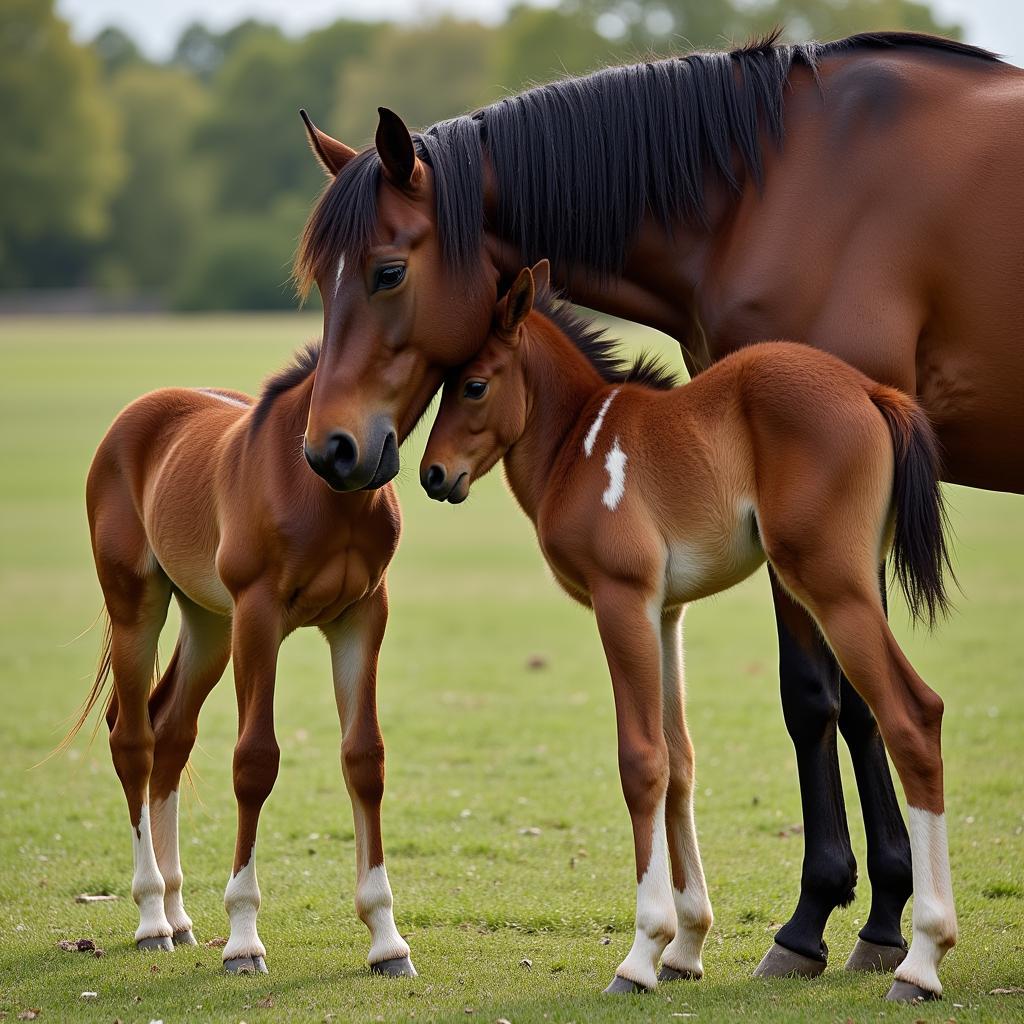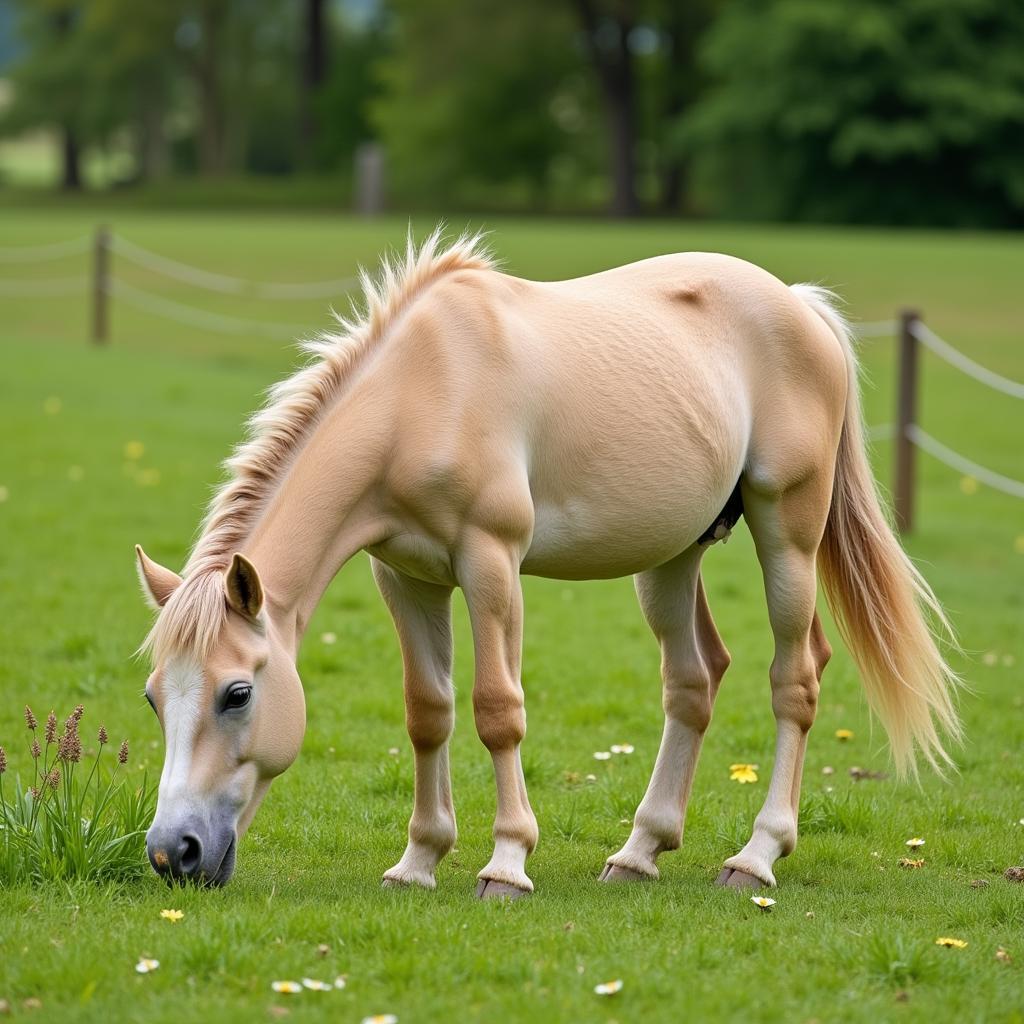Miniature horses have captured the hearts of horse lovers worldwide with their diminutive size and charming personalities. If you’re considering breeding these pint-sized equines or are simply curious about their reproductive cycle, understanding the gestation period for mini horses is essential.
Factors Influencing Mini Horse Gestation
While the average Gestation For Mini Horses is similar to that of their full-sized counterparts, several factors can influence the duration.
1. Individual Variation
Just like humans, each mini horse pregnancy is unique. Some mares naturally carry their foals a bit longer than others.
 Miniature Horse Mare and Foal
Miniature Horse Mare and Foal
2. Nutrition and Overall Health
A mare’s diet and overall well-being directly impact her pregnancy. Proper nutrition is vital throughout gestation to support the developing foal and ensure a healthy delivery.
3. Seasonality
Mini horses are seasonally polyestrous, meaning they experience multiple estrus cycles during specific times of the year. Typically, breeding season aligns with longer daylight hours.
Signs of Pregnancy in Mini Horses
Detecting pregnancy early on is crucial for providing appropriate care for the expectant mare. Here are some common signs:
- Lack of Estrus: A pregnant mare will not show signs of heat (estrus) after about 18 days post-breeding.
- Behavioral Changes: Some mares may display changes in temperament, becoming more docile or, conversely, more irritable.
- Physical Changes: As the pregnancy progresses, physical changes such as weight gain, a larger abdomen, and mammary development will become apparent.
Caring for a Pregnant Mini Horse
Providing optimal care for a pregnant mini horse is essential for a successful outcome. Key aspects include:
- Veterinary Care: Regular checkups by a veterinarian experienced with miniature horses are crucial throughout the pregnancy.
- Nutrition: Consult your veterinarian to develop a tailored feeding plan that meets the mare’s increasing nutritional needs as gestation advances.
- Exercise: Maintain a moderate exercise routine for the mare, such as daily walks or light riding, to support overall health and muscle tone.
 Pregnant Miniature Horse Grazing
Pregnant Miniature Horse Grazing
Preparing for the Arrival of a Mini Foal
As the mare nears her due date, it’s essential to have a plan in place for the foal’s arrival. This includes:
- Preparing a Foaling Area: Create a clean, safe, and well-bedded area for the mare to give birth.
- Having Necessary Supplies: Gather supplies such as towels, disinfectant, and a foal halter in advance.
- Monitoring the Mare Closely: Be prepared to assist the mare during labor and contact your veterinarian if any complications arise.
Frequently Asked Questions
Q: How can I tell if my mini horse is pregnant?
A: Early signs include a lack of estrus, behavioral changes, and gradual physical changes such as a larger abdomen. Veterinary confirmation through ultrasound is recommended.
Q: Can a horse slicker be used on a pregnant mini horse?
A: Yes, a horse slicker can be used gently to groom a pregnant mini horse, helping to keep her coat clean and comfortable.
Q: What kind of horse shampoo and conditioner is safe for pregnant mares?
A: Choose gentle, pH-balanced products specifically formulated for horses. Always consult your veterinarian to ensure the products are safe for pregnant mares.
Q: How long does a miniature horse stay pregnant?
A: The average gestation for mini horses is around 320 days, with some variation depending on individual factors.
Q: Do mini horses need special care during pregnancy?
A: Yes, pregnant mini horses require specialized care, including regular veterinary checkups, a tailored diet, and appropriate exercise.
Conclusion
Understanding the gestation period and specific needs of pregnant mini horses is vital for responsible breeding and ownership. By providing attentive care, proper nutrition, and a safe environment, you can contribute to a healthy pregnancy and the arrival of a thriving mini foal. If you have any concerns or require assistance during your mini horse’s pregnancy, don’t hesitate to contact your veterinarian.
When you need support, please contact us. Phone Number: 0772127271, Email: [email protected]. Or visit us at: QGM2+WX2, Vị Trung, Vị Thuỷ, Hậu Giang, Vietnam. We have a 24/7 customer service team.